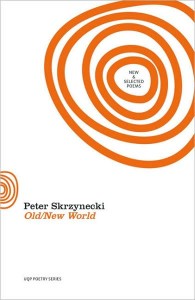 Old/New World: New & Selected Poems by Peter Skrzynecki
Old/New World: New & Selected Poems by Peter Skrzynecki
University of Queensland Press, 2007
Peter Skrzynecki is renowned for his poetic rendering of migrant experience, over three decades, and was awarded a Medal of the Order of Australia 'for his contribution to multicultural literature' in 2002. His Immigrant Chronicle (1975) is a prescribed text for the New South Wales HSC, which has ensured continued exposure for Skrzynecki's poetry, as well as sales of over 20,000 for Immigrant Chronicle. This is commendable, but, of course, it has to be said that Skrzynecki cannot speak for all migrants and the range of their experiences. Nor does he probably intend to.
In 'Migration and Poetry' (published in Five Bells), Marcelle Freiman writes:
Memory, place and a sense of home, or rather homelessness, characterise writing of migration; the creativity that emerges from displacement is the impulse to create places of the mind in language and poetry.
These more general hallmarks of migrant writing are the warp and weft of Skrzynecki's body of work, and the elements that keep him on the HSC reading list. Specifically, the experiences he portrays are distinctly European. Skrzynecki's family came to Australia from Germany in 1949 and lived for a while in migrant hostels at Bathurst and Parkes; his ancestry is Polish/Ukrainian and he spent his early years in a displaced persons camp in Germany, until the end of the war.
This new volume of poetry, Old/New World – one of two 'new look' poetry series titles from University of Queensland Press – contains over 180 poems selected from eight collections published between 1970 and 2000 and the 2006 collection, Blood Plums. The book's strength is its bringing together of old and new poems in a single collection, allowing the reader to become immersed in Skrzynecki's poetry and to gauge his development as a poet over many years of writing practice. Its weakness is a tendency to repeat markedly similar themes and images. Several poems have the same or similar titles, for example 'Jeogla' / 'Jeogla (2)', and four numbered poems with the title Styx River. Although, on closer examination, the poems are sufficiently different, this adds to the impression of repetition.
The poems in this new and selected edition represent lived experiences from an often-nostalgic perspective, as demonstrated in 'The Wind in the Pines':
The wind in the pines
sounds exactly the same
as it did thirty years ago –
when I stood in the same place
where I'm standing now
and looked back to where I'd come from:–
it blows nonstop
along the yellow-dust road
that's run for thirty years
like a scar on my heart.
Past and present, old and new are embedded structures in the majority of these poems, as the poet revisits landscapes (predominantly Australian) remembering significant places and phases of his life.
Birds are often the subject of Skrzynecki's poems and this collection is alive with ravaging lorikeets, fearless seabirds, mythological bellbirds, sparrows, swans, apostlebirds, finches and black cockatoos. Animals, fish and reptiles also feature. In 'Devil Fish', for example:
A rat-trap mouth, skinless,
each bone a grasshopper's leg –
eyes like portholes we can't look into
from anywhere on zones of palm or ice.–
Exiled from a pock-marked sun
The fish's journey by sea is identified with the displaced person's sense of exile. 'Tadpoles' takes the poet back to his childhood days spent catching tadpoles with a group of other boys:
We knew nothing about
breaking life-cycles or offending Mother Nature.
We just called it 'having fun'
Fifty years later, he is haunted by the tadpoles they left in jars in the sun to die, the boys living out 'the cruel parts of their lives'. Skrzynecki's character portraits capture and express the little details of everyday life that make his subjects live on the page. Feliks Skrzynecki, the poet's father, later revealed not to be his biological father, 'loved his garden like an only child'; we see him sweeping paths, holding the broom with his cement-darkened hands and cracked fingers, smoking on the back steps, watching the stars. Kornelia Woloszczuk carries the weight of her lost son, her only child, drowned in a swamp:
In springtime
she walks beside
a river, pointing out
how water destroys images
that reflect eternity
'Elegy for Don McLaughlin' remembers an old school friend killed in a head-on car accident at seventeen, who 'sang like Burns wrote poetry – / purely, the accent on love'. Another elegy, for Roland Robinson, implies a deep connection between the two poets:
A spur-winged plover passed
over my house the night you died –
crying and circling before it disappeared
into the echoes of wind and rain
The imagery in Skrzynecki's poems, frequently beautiful (particularly when drawn from natural landscapes), is at times unremarkable in the more prosaic pieces. The theme of old and new worlds encompasses the poems of migration, the elegies, the character poems and is used in the poem 'Leukaemia' to signify hope:
[waiting] for a new world
to take over your body
so the old can be defeated,
left behind
Old/New World is peopled with a lifetime of poems, chronicling the forging of new lives in new countries and the adjustments to be made when old familiar worlds are changed forever by trauma or grief. The journey is not merely one of physical travel, but of spiritual quest and emotional travail punctuated by moments of joy and nostalgic remembering.









